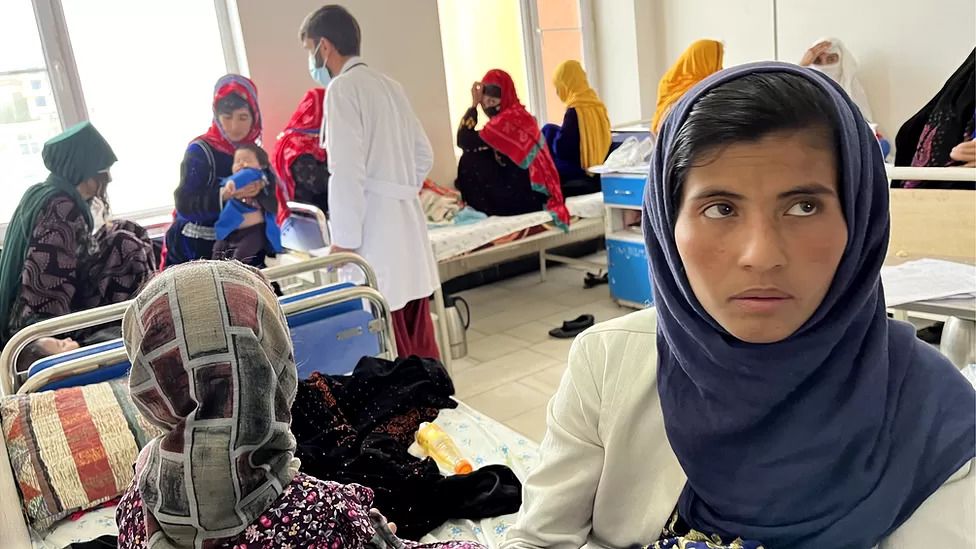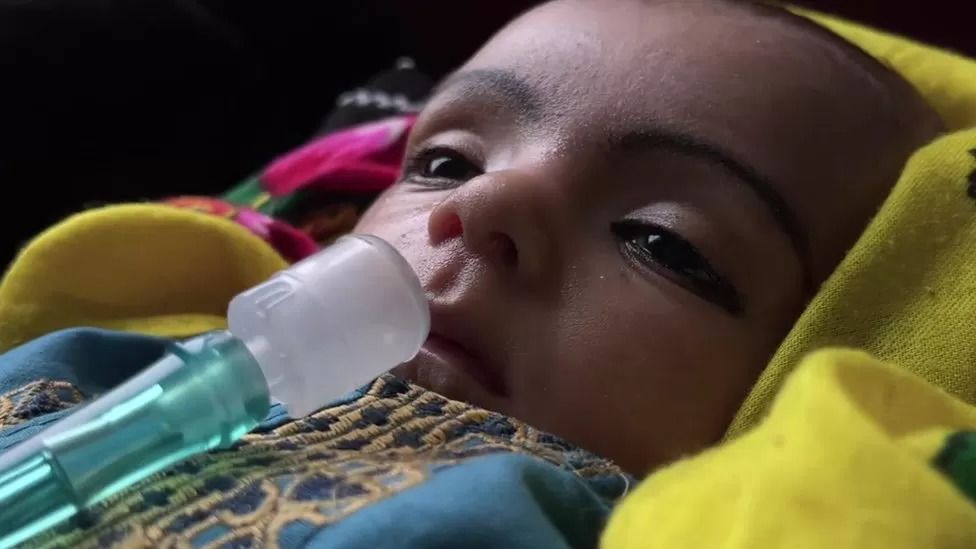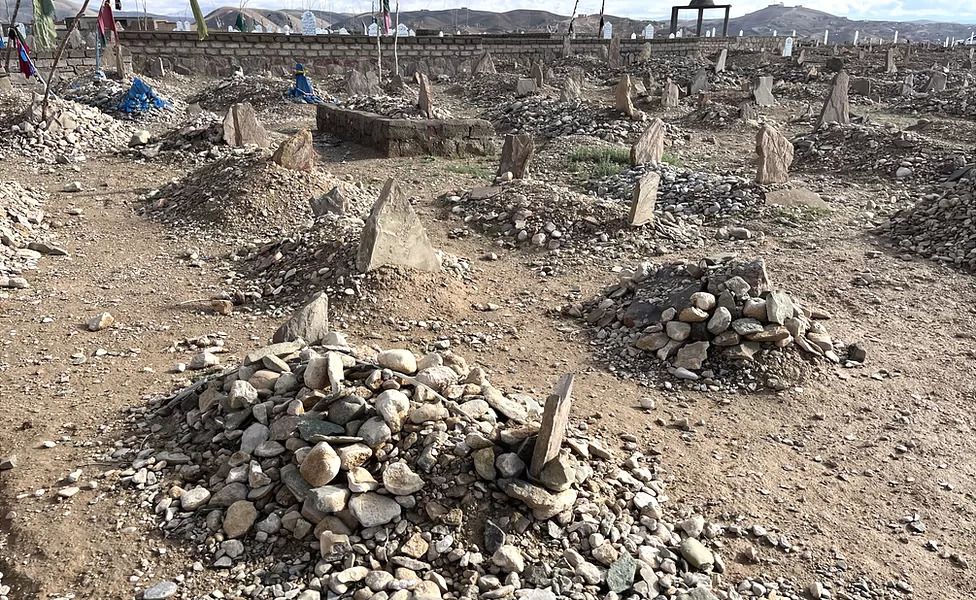
Afghanistan: 'Nothing we can do but watch babies die'
She begins to cry as she realises her son is fading.
At this hospital in Afghanistan, there is not a single working ventilator.
Mothers hold oxygen tubes near their babies' noses because masks designed to fit their small faces are not available, and the women are trying to fill in for what trained staff or medical equipment should do.
Every day, 167 children die in Afghanistan from preventable diseases, according to the UN children's fund Unicef - illnesses that could and should be cured with the right medication.
It is a staggering number. But it's an estimate.
And when you step inside the paediatric ward of the main hospital in the western province of Ghor, you will be left wondering if that estimate is too low.
Multiple rooms are full of sick children, at least two in each bed, their little bodies ravaged by pneumonia. Just two nurses look after 60 children.
In one room, we saw at least two dozen babies who appeared to be in a serious condition. The children should have been continuously monitored in critical care - impossible at this hospital.
Yet, for the million people who live in Ghor, this basic facility is still the best equipped public hospital they can access.
 Mothers are left distraught at this Afghanistan hospital where children die of preventable or curable diseases
Mothers are left distraught at this Afghanistan hospital where children die of preventable or curable diseases
Public healthcare in Afghanistan has never been adequate, and foreign money which almost entirely funded it was frozen in August 2021 when the Taliban seized power. Over the past 20 months, we have visited hospitals and clinics across this country, and witnessed them collapsing.
Now the Taliban's recent ban on women working for NGOs means it's becoming harder for humanitarian agencies to operate, putting even more children and babies at risk.
Already defeated by a lack of resources, medics at the Ghor hospital used whatever little they had to try to revive Tayabullah.
Dr Ahmad Samadi was called in to check his condition, fatigue and stress visible on his face. He put a stethoscope to Tayabullah's chest - there was a faint heartbeat.
Nurse Edima Sultani rushed in with an oxygen pump. She put it over Tayabullah's mouth, blowing air into it. Then Dr Samadi used his thumbs to perform compressions on the boy's tiny chest.
Watching on looking stricken was Tayabullah's grandfather Ghawsaddin. He told us his grandson was suffering from pneumonia and malnutrition.
"It took eight hours on rubble roads to bring him here from our district Charsadda," Ghawsaddin said. The family, who can only afford to eat dry bread for meals, scraped together money to pay for the ride.
For half an hour, the efforts to revive his grandson continued. Nurse Sultani then turned towards Nigar and told her Tayabullah had died.
The sudden silence which had enveloped the room was broken by Nigar's sobs. Her baby boy was wrapped in a blanket and handed over to Ghawsaddin. The family carried him home.
Tayabullah should be alive - every disease he had was curable.
"I'm also a mother and when I saw the baby die, I felt like I've lost my own child. When I saw his mother weeping, it broke my heart. It hurt my conscience," said Nurse Sultani, who frequently does 24-hour shifts.
"We don't have equipment and there is a lack of trained staff, especially female staff. When we are looking after so many in serious conditions, which child should we check on first? There's nothing we can do but watch babies die."
 There are no oxygen masks in the hospital small enough to fit a baby's face
There are no oxygen masks in the hospital small enough to fit a baby's face
Minutes later, in the room next door, we saw another child in severe distress, with an oxygen mask on her face, struggling to breathe.
Two-year-old Gulbadan was born with a heart defect, a condition called patent ductus arteriosus. It was diagnosed six months ago at this hospital.
Doctors have told us the condition is not uncommon or hard to treat. But Ghor's main hospital is not equipped to perform routine surgery that could fix it. It also doesn't have the medicines she needs.
Gulbadan's grandmother Afwa Gul held down her small arms, to try to prevent the little girl from pulling down her mask.
"We borrowed money to take her to Kabul, but we couldn't afford surgery, so we had to bring her back," she said. They approached an NGO to get financial help. Their details were registered but there's been no response since then.
Gulbadan's father Nawroze stroked her forehead, trying to soothe his daughter who winced with every breath she took. Stress etched on his face, he pursed his lips and let out a sigh of resignation. He told us Gulbadan had recently begun to talk, forming her first words, calling out to him and other members of their family.
"I'm a labourer. I don't have a stable income. If I had money, she would never have suffered this way. At this moment, I can't even afford to buy one cup of tea," he said.
I asked Dr Samadi how much oxygen Gulbadan needs.
"Two litres every minute," he said. "When this cylinder gets empty, if we don't find another one, she will die."
When we went back later to check on Gulbadan, we were told that's exactly what had happened. The oxygen cylinder had run out, and she died.
The oxygen production unit at the hospital isn't able to produce sufficient oxygen because it only has power at night, and there isn't a steady supply of raw material.
In a matter of a few hours, two children died of diseases that could have been prevented or cured. It's a crushing but all too familiar blow for Dr Samadi and his colleagues.
"I feel exhaustion and agony. Every day we lose one or two beloved children of Ghor. We have almost got accustomed to it now," he said.
Walking around the rooms, we saw an overwhelming number of children in distress. One-year-old Sajad's breathing was raspy. He's suffering from pneumonia and meningitis.
In another bed is Irfan. When his breathing became more laboured, his mother Zia-rah was given another oxygen pipe to hold near his nose.
Wiping tears that rolled down her cheeks with her upper arm, she carefully held both pipes as steady as she could. She told us she would have brought Irfan to the hospital at least four or five days earlier if the roads had not been blocked by snow.
So many simply can't make it to hospital, and others choose not to stay once they get there.
"Ten days ago a child was brought here in a very critical condition," Nurse Sultani said. "We gave him an injection, but we didn't have the medicines to cure him.
"So his father decided to take him home. 'If he has to die, let him die at home'," he told me.
 Mothers sit alongside children with oxygen cylinders - but the hospital is unable to provide sufficient quantities
Mothers sit alongside children with oxygen cylinders - but the hospital is unable to provide sufficient quantities
What we saw in Ghor raises serious questions about why public healthcare in Afghanistan is crumbling so quickly, when billions of dollars were poured into it by the international community for 20 years until 2021.
Where was that money spent, if a provincial hospital doesn't have a single ventilator for its patients?
Currently there is a stop-gap arrangement in place. Because money can't be given directly to the internationally unrecognised Taliban government, humanitarian agencies have stepped in to fund salaries of medical staff and the cost of medicines and food, that are just about keeping hospitals like the one in Ghor running.
Now, that funding, already sorely inefficient, could also be at risk. Aid agencies warn that their donors might cut back because the Taliban's restrictions on women, including its ban on Afghan women working for the UN and NGOs, violates international laws.
Only 5% of the UN's appeal for Afghanistan has been funded so far.
 A burial ground in the hills near the hospital in Ghor, where at least half of the new graves belong to children
A burial ground in the hills near the hospital in Ghor, where at least half of the new graves belong to children
We drove up one of the hills near the Ghor hospital to a burial ground. There are no records or registers here, not even a caretaker. So it's not possible to find out who the graves belong to, but it's easy to distinguish big graves from small ones.
From what we saw, a disproportionate number - at least half - of the new graves belong to children. A man who lives in a house close by also told us most of those they are burying these days are children.
There may be no way to count how many children are dying, but there is evidence everywhere of the scale of the crisis.











